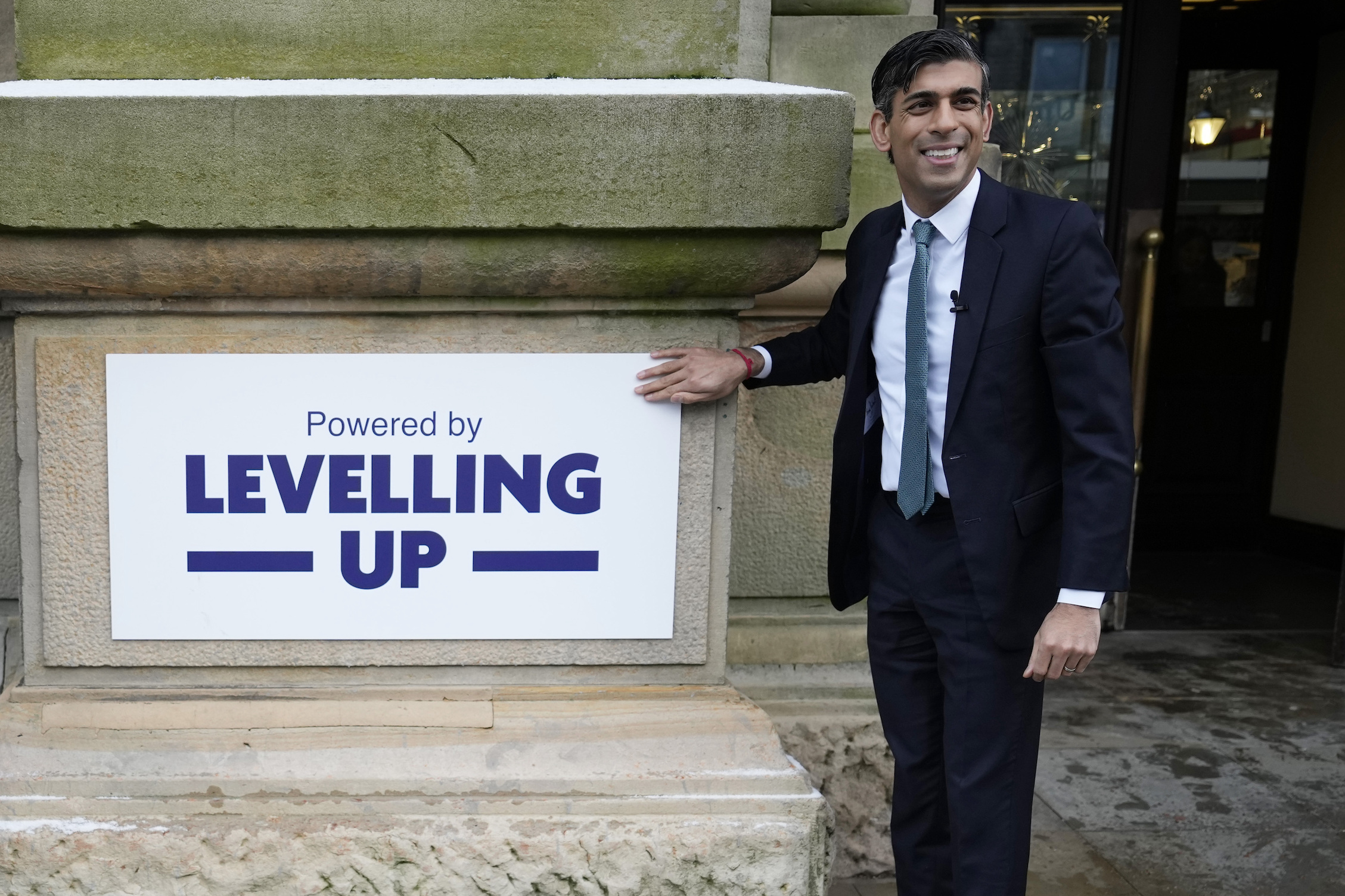This had the potential to be a good week for the prime minister. While Labour leader Sir Keir Starmer was off wooing the global financial elite at the World Economic Forum in Switzerland, promising closer ties to the EU and playing pretend as prime minister, Sunak would be touring Britain, trumpeting a £2.1bn “levelling up” investment and focusing on his favourite new buzzword: “delivery”.
But as with so much else with the prime minister at the moment, things just did not go to plan.
Fiasco followed fiasco, with news breaking that Britain’s lead lawmaker is set to face another police fine after filming a video in a moving car without a seatbelt. Seatbeltgate stole much of the media attention, but there was time too for intricate breakdowns of Sunak’s new funding announcements on levelling up. After all was said and done, it was the details of the latest tranche of levelling up funding that sparked the most significant furore.
Analysis found that large sums of the headline £2.1bn funding package is going to areas with relatively low levels of deprivation. In total, £151m is going to London, while the North East gets £108m and the Humber is getting £120m. It was also highlighted that, of the £1.9bn of spending that could be linked to individual constituencies, £1.2bn — around 63 per cent — had gone to seats held by Conservative MPs.


Then there was the matter of Richmond, the prime minister’s own constituency, which received another heap of cash (as it did in the fund’s first round). The news that the PM’s own constituency was receiving £19m in funding, while the cities of Birmingham, Nottingham and Stoke missed out, raised eyebrows significantly.
MPs and local leaders alike criticised the government’s preferred method of allocating funding to local authorities via bidding competitions judged by ministers. Shadow levelling up secretary Lisa Nandy rubbished a “Hunger Games-style” system, while Conservative mayor of the West Midlands Andy Street blasted “Whitehall’s bidding and begging bowl culture”.
Amid the outrage, many referred to the video which surfaced over the summer which caught Sunak boasting that he had deliberately diverted public money from “deprived urban areas” during his time as chancellor. Given that new levelling up funding seemed to be heading disproportionately Southward, the video underlined anew for many the calculated farce of the “rebalancing” project.
Sunak tries his best Boris Johnson impression
The “levelling up” slogan first appeared as a new soundbite in the early stages of the 2019 election. The slogan was deliberately slippery, intended to subvert anti-Westminster feelings for Boris Johnson’s own political purposes. In the end, it encapsulated Johnson’s stated concern with spreading opportunity across the country and was central to his successful pitch at “red wall” constituencies.
Levelling up was Johnsonianism distilled: a catchy slogan, a few billion quid and a monument to point to at the end of it all. It meant high-spending, headline-grabbing infrastructure projects. This side of Johnsonianism was summed up neatly by Dominic Cummings in a recent New York Magazine interview: “The only thing he was really interested in — genuinely excited about — was looking at maps. Where could he order the building of things?”, Johnson’s former top adviser said.
In short: as long as shovels were in the ground, Johnson thought he was winning.
The bidding war incited by the levelling up project would see communities pitted against each other, pining for Johnson’s attention and Whitehall’s cash. The PM would then tour the country, pointing to the physical markers of his success. His legacy would be then writ in stone across Britain’s high streets. “Thank you Boris”, Britain would collectively bay.
But where Johnson was able to make levelling up central to his political brand, for Sunak, it’s fast becoming a vulnerability. This is a serious problem for the Conservative party. Levelling up has never been large enough nor targeted enough to make a dent in regional inequalities — but balanced by Johnson’s boosterism, it could be electorally gripping. And unfortunately for Conservative MPs, Sunak does not possess Johnson’s powers of performance.
This highlights another important point. For the levelling up debate begs further questions about Rishi Sunak’s political identity. Our prime minister is a treasury technocrat, better suited to fiddling with funding formulas than revelling in levelling up “success”. Whereas Boris Johnson never saw a spending commitment he didn’t like, Sunak is a fiscal Conservative in the truest sense. The very idea of big-spending infrastructure projects seems to jar with his political instincts.
It is telling that in his resignation letter as chancellor last year, Sunak wrote Johnson: “I firmly believe the public are ready to hear that truth. Our people know that if something is too good to be true then it’s not true”. He stated moreover that their approach to economic policy was “fundamentally too different”. It was a clarion call for spending restraint.
So while Johnson’s boosterism made him the perfect frontman for levelling up, Sunak’s natural fiscal caution means he can never truly own the mission he inherited. It means that even in lieu of a comeback, the spectre of Sunak’s predecessor-once-removed still looms large over his policy platform.
Far from a moment of triumph, the levelling up announcement this week has underlined anew Sunak’s political vulnerabilities. Johnson promised the world to the red wall post-2019, and Sunak is finding it difficult to deliver. Come an election in 2024, this will leave the prime minister massively exposed in Conservative marginals.
At best, Sunak can only do a poor imitation of Boris Johnson on levelling up. In the long run, it may just leave Tory MPs hankering for the real deal.
Sir Keir Starmer, snacking on canapés in Davos, cannot believe his luck.

